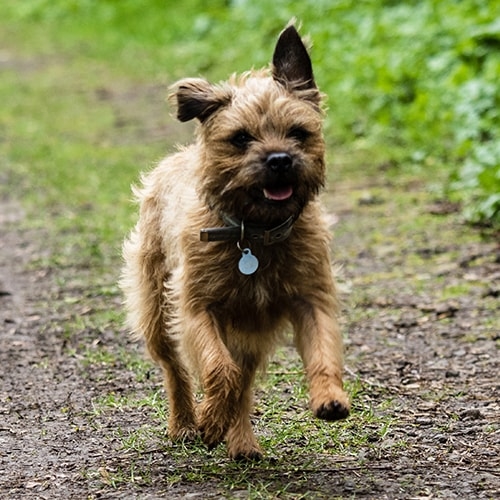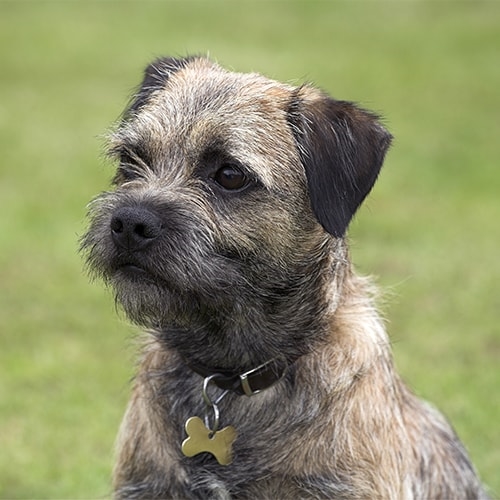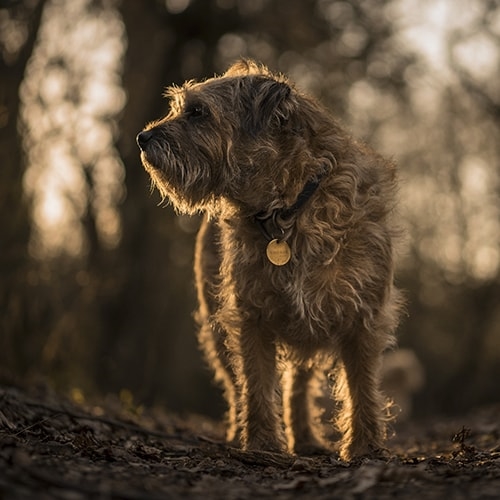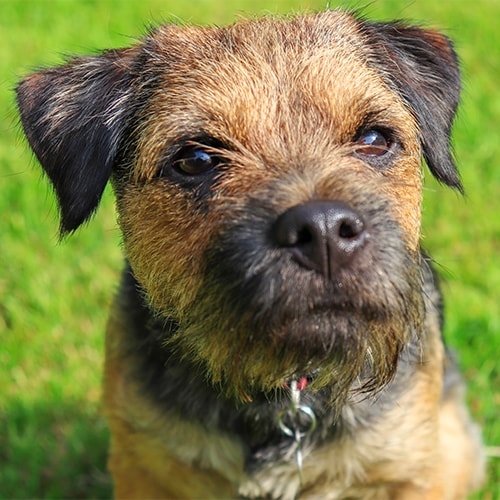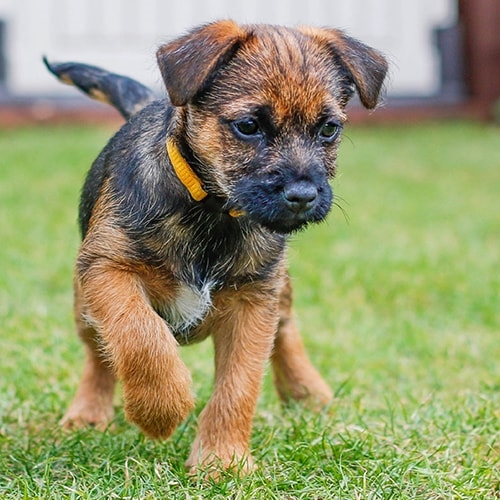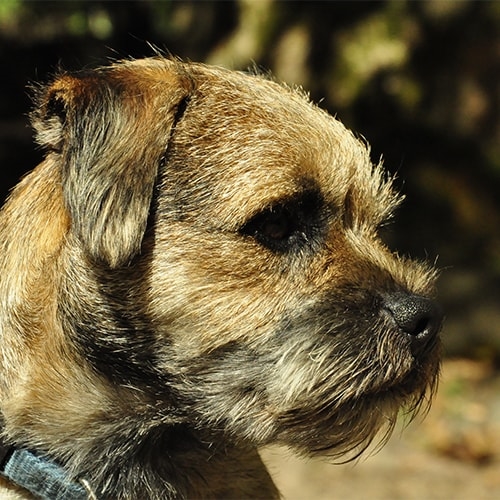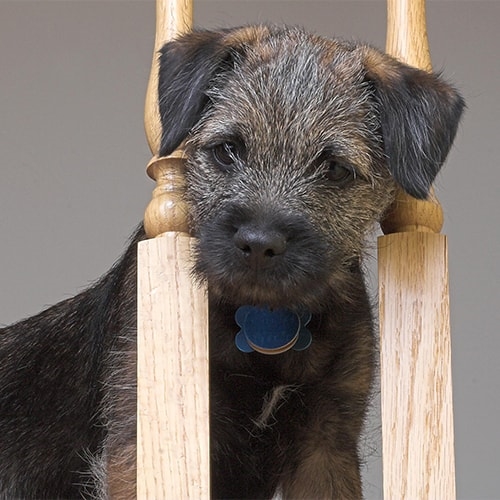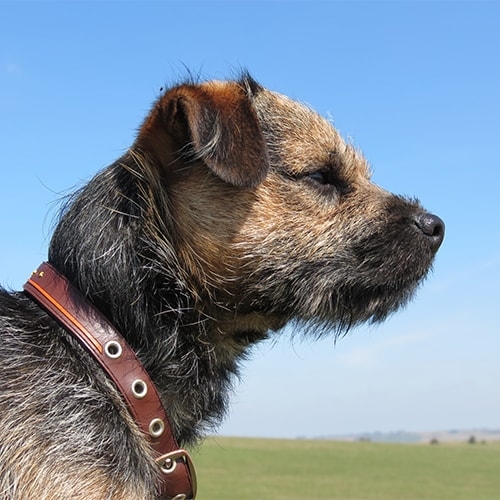| Size | Small |
|---|---|
| Average height | 25-28 cm |
| Average weight | 5-7 kg |
| Average lifespan | Over 12 years |
| Minimum exercise (per day) | 1 hour |
| Coat length | Short |
| Minimum cost (per month) | £70 |
Despite their small size, Border Terriers are energetic dogs with big personalities to match. They’re keen to learn new things and so can be easy to train in the right hands. They love to play and interact with their owners at any given opportunity so can be great companions.
Border Terriers are a very adaptable breed and are happy in a variety of situations which is why they are such popular pets. They fit in well with most families as long as you have plenty of time to spend with them.
Common health problems in Border Terriers
Border Terriers are fun-loving and excitable little dogs who are happy to go along with whatever their owner is doing at the time. Unfortunately, like so many other purebred dogs, they are at risk of certain problems and conditions relating to their breed.
If you are thinking of buying a Border Terrier puppy, make sure the parents of your puppy have had the relevant health screening to reduce the chances of your puppy being affected by certain conditions. We’d recommend looking for a Kennel Club Assured Breeder as they meet extra requirements which will benefit your puppy’s health.
Some of the conditions Border Terriers may develop include:
- Luxating patellas – where the kneecaps slip temporarily out of place. Before breeding parents can be checked by a vet for this.
- Skin problems.
- Ear problems.
- SLEM (Spongiform LeucoEncephaloMyelopathy) or shaking puppy syndrome. There is currently DNA testing for this.
- Canine Epileptoid Cramping Syndrome (CECS) – tremors, muscle spasms, seizures, affecting whole or part of body.
- Canine Gallbladder Mucocoele – this is where the gall bladder has difficulty emptying and may require surgical removal.
If you want to minimise the risk of your dog getting problems due to exaggerated features, you can read our advice on choosing a pedigree dog.
Caring for your Border Terrier
Border Terriers are great little dogs who, despite their huge amounts of energy, are fairly laid-back. As long as they get enough exercise, they are happy to live almost anywhere – whether this is in a town or city, or out in the countryside.
If you’re thinking of getting a Border Terrier, it is ideal to have a secure garden they can play and have free-time in. Like most terriers, they tend to chew anything and everything so make sure you have plenty of dog friendly toys to keep them occupied. They are also very good at digging, so it’s worth making sure the garden is fully secure and that they can’t slip under any fences. They’re not the best pets if you like a tidy garden.
Border Terriers and barking
As with any other dog, your Border Terrier is likely to make noise and how much they vocalise will be down to the individual. Border Terriers are not known for being noisy but they may bark to let you know if they’re unhappy or just to get your attention. If you’re having problems with excessive noise and barking we recommend seeking the advice of an accredited behaviourist.
Training and socialisation
In the right hands, Border Terriers can be easy to train as they are such quick learners and eager to please their owners. It’s important to use positive, reward-based training as Border Terriers are sensitive and don’t respond well to other training methods. Some Border Terriers are known to be independent when it comes to their training so a firm but fair attitude is a must. If you’re a first-time owner, you may want to consider taking your dog to training classes.
While Border Terriers are super adaptable, it’s important to socialise them with lots of different places, experiences, people and dogs from a young age. This will help them to be confident dogs and stop them getting worried when you’re out and about.
Border Terriers are known for developing separation anxiety if they are left alone because they form such strong bonds with their owners. It’s better if there is someone with your dog all day and they are not left on their own. A worried and lonely Border Terrier can be very destructive around the house.
Exercise
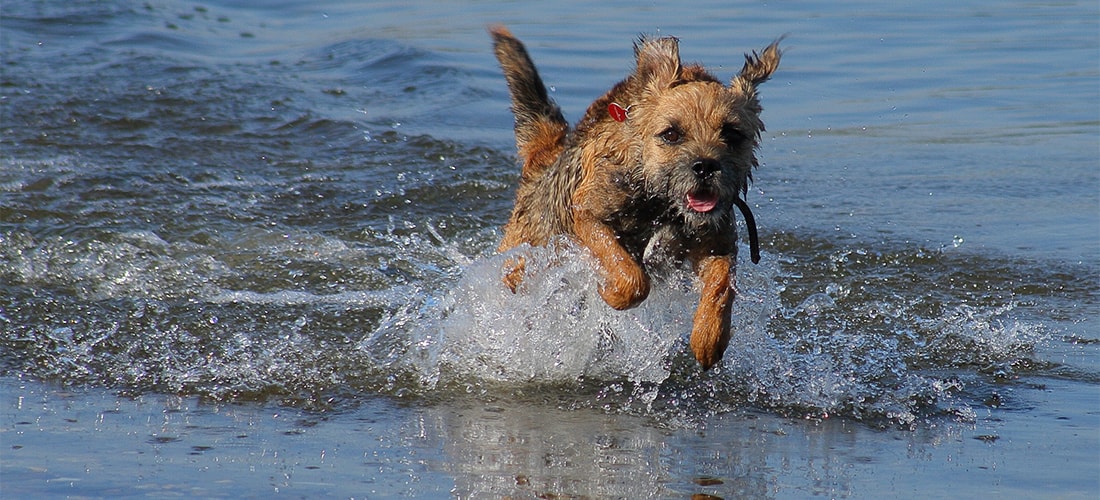
Border Terriers have bags of energy and need plenty of exercise every day to stay happy and healthy. They’ll be more than happy to join you on long walks in new places (just remember to keep a tight grip on their lead – one whiff of something to chase and they’ll be off).
Your Border Terrier will need a minimum of an hour exercise every day. This should be split into a couple of walks with some off-lead time in a secure area. On top of this, your Border Terrier will also need lots of playtime, training sessions and free time.
Grooming
Like any dog, your Border Terrier is likely to shed throughout the year. They have short, coarse wiry coats and so a brush a couple of times a week should help keep on top of dead hairs but they may require professional grooming in spring and autumn to keep them looking smart. Some owners prefer the shaggy look so it’s really down to your preference.
As they love to dig and go out on adventures, you might find your Border Terrier is muddy and needs a bath from time to time. Remember to use a dog-safe shampoo and ask your vet for advice if you are unsure.
Border Terriers and children
Border Terriers are not known for being aggressive dogs and given the right socialisation will love spending time with children of all ages. This said, don’t forget that Border Terriers are energetic and can sometimes get a little over excited, so make sure to calm playtime down if things are getting too boisterous.
Always supervise your Border Terrier with children and vulnerable adults to avoid any accidents.
Border Terriers and other pets
As long as your Border Terrier is well-socialised with other dogs from a young age, they should get along well with them. Some owners say that they are a more social breed so you may find they enjoy the company of other dogs.
If you Border Terrier has grown up with a cat, they should get along but you will need to supervise them when they are together. We wouldn’t recommend keeping a Border Terrier with other, smaller pets such as rabbits, guinea pigs and rats as they have such a high prey drive they might see them as something to chase rather than part of the family!
Food
Your Border Terrier’s diet will vary depending on their age. You’ll need to feed them a complete, balanced dog food to keep them slim and healthy.
Your vet will be able to tell you how much your Border Terrier should be eating. You should feed them a good quality, commercially available, complete dog food. We usually recommend splitting their daily allowance into two meals. If you give your dog the occasional treat or use treats for training, remember to take this into account and reduce their daily allowance. Treats shouldn’t make up more than 10% of their daily calorie intake as this can unbalance their diet.
You should try to feed your dog at the same time every day to get them into a routine. Remember to leave at a gap after eating and before exercising.
The cost of owning a Border Terrier
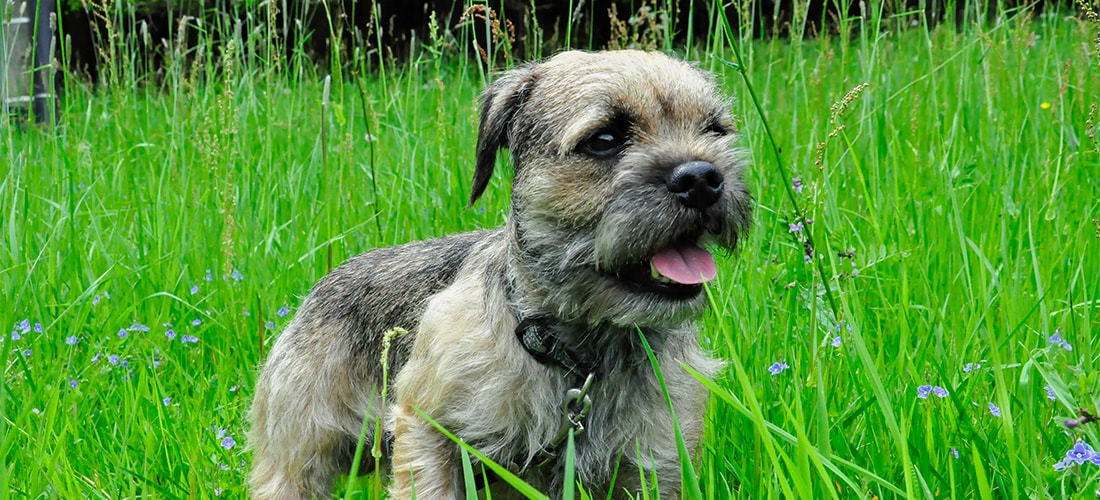
You can expect your Border Terrier to cost you a minimum of £70 per month after purchase and set-up costs and over £12,000 across their lifetime.
Costs you’ll need to think about include:
Purchase costs
Adopting an adult Border Terrier from a rescue centre may be a more cost-effective option, with the added advantage of giving a home to a pet without one – check if the rehoming centre you’re looking at asks for a donation for rehoming.
If instead you’re buying a Border Terrier puppy from a breeder, you’ll need to factor in this cost. Beware unusually cheap puppies as they could come from a puppy farm. If you’d like to buy a pedigree puppy, we recommend looking for a Kennel Club Assured breeder. These breeders must do extra health tests and meet high standards.
Set-up costs
- Puppy vaccines – if you rescue a dog, reputable centres will often vaccinate them for you. Remember that ongoing booster vaccinations will be needed to continue their immunity.
- Neutering – you should usually arrange for your dog to be neutered at around six months old, though your vet will be able to advise you exactly when is best. Check prices at your local practice as these will depend on your vet and where you live. Some rescue centres will neuter any dogs they rehome, saving you this cost.
- Equipment – including a collar and tags, lead, harness, dog beds, dog bowls, pet-safe toothpaste and toothbrushes, grooming brushes and toys. Keep in mind that all these will need to be replaced with wear or damage or if your dog outgrows or damages them!
Ongoing costs
- Food.
- Preventive healthcare – budget for routine vet visits to help stop your dog getting ill and catch any problems early. They need annual check-ups, vaccinations and regular flea and worming treatments. Check if your vet offers a health care plan as this can help spread the cost throughout the year.
- Vet bills* or pet insurance – if you don’t have pet insurance and your dog needs veterinary treatment for an injury or illness, costs can rapidly mount up. Check what’s covered and what isn’t when comparing policies.
- Accessories – including lots of poo bags, replacing worn toys and grooming accessories, buying doggy toothpaste and any other extras they might need.
Other costs
- Training – basic training is very important and dogs can benefit from formal classes. Some dogs may have, or develop, behavioural problems which might need professional management.
- Boarding – you may also need to budget for boarding or dog sitting costs if you are planning to go away from home on holiday.
- Dog walkers/day-care – you might consider a professional dog walker to keep your dog happy and healthy if you’re unable to get out with your dog enough yourself, or to look after them during the day if you need to be out for more than four hours.
* It’s always better to plan ahead and budget or get pet insurance in case your pet gets injured or unwell. If you are having difficulty with veterinary costs, you can check if you are eligible for treatment at PDSA here.
If you’re considering pet insurance, our PDSA Pet Insurance could be a great option for you and it’s quick and easy to get a quote online.
Fun facts
- Border Terriers love to dig! You may find more than a few holes in your garden if they are left to their own devices.
- They have a double coat, which helps their fur to be water repellent. They’re also known to resemble otters.
- Border Terriers are energetic and excitable little dogs who are very quick and agile.
- They are clever dogs, so a Border Terrier can get bored quite easily. They’re skilled escape artists so it’s best to keep them occupied as much as possible.
Getting a Border Terrier
Do plenty of research before getting a Border Terrier. These fun loving and active little dogs need plenty of attention and exercise to make sure they don’t get bored. Despite their small size, they have big personalities and in return for your care and commitment you’ll get a loving and entertaining dog in return!
Rehoming centres
There are plenty of rescue centres across the country where you may find a Border Terrier. Breed-specific rescues that specialise in Border Terriers are also out there. You’ll need to ask any rescue centre about the dog’s history to make sure they will be comfortable in your home. Good rescue centres should let you know of any health and behaviour problems.
Breeders
If you buy from a breeder, make sure your puppy will be well socialised and have all necessary screening tests, health checks and vaccinations. It’s really important that Border Terrier puppies from a breeder get the right early socialisation so always ask the breeder about how they go about this. We recommend looking for a Kennel Club Assured breeder as they meet higher standards. We’ve put together some advice to help you find a good breeder.

